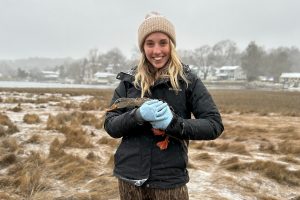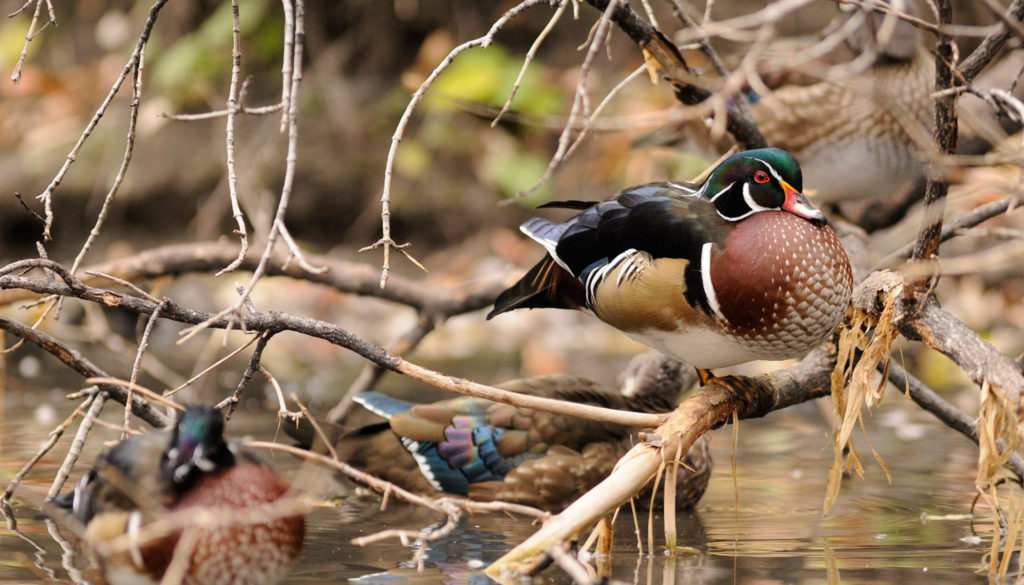The objectives of the fellowship are to assist in developing talented young professionals who are dedicated to furthering the conservation of wetlands and wildlife, and to advance the scientific understanding of waterfowl and wetland biology in North America.

The recipient of this fellowship is Cassidy Waldrep from the University of Saskatchewan. Her study will focus on the impact that movement, behaviour, and weather have on the reproductive success of mallards in eastern North America.
Reproductive success rate greatly affects fluctuations in duck populations, yet it can be influenced by factors that occur outside the breeding season. Examining the full annual life cycle of ducks can help us understand these seasonal carry-over effects. Cassidy will deploy ~1100 GPS-acceleration tracking devices to characterize reproductive success and assess differences in both breeding and non-breeding periods between one stable and one declining subpopulation of eastern mallards. This project will inform conservation plans by providing insight into factors limiting eastern mallard populations.
About the Fellowship
This fellowship is open to graduate students enrolled at any North American University. Subject matter for the student’s research can deal with any aspect of waterfowl or wetland biology that promises to advance conservation. Fellowships will be awarded based upon the following criteria:
- The qualifications of the applicant
- The scientific soundness of the student’s research proposal
- Originality and creativity in study design
- Expected contributions of the research to furthering waterfowl conservation
- The achievability of the work.
One award of up to $9,500/year (U.S. funds) is available to provide personal or research support for the successful applicant. The award is renewable for up to two additional years for PhD students, once for Master’s students, assuming annual approval of a satisfactory progress report and the need for continuing financial support.
For additional information on this fellowship, download the Graduate Fellowships Background document.
Past Fellowship Winners
2021-2023: Alec Schindler, PhD. Development of a full annual cycle framework using state-of-the-art GPS-acceleration tracking devices on waterfowl: the case of the Greenland white-fronted goose, University of Saskatchewan
2020: Cheyenne Beach, MSc. Evaluating the physiological response of sub-lethal infections of Sphaeridiotrema spp. and Cyathocotyle bushiensis trematodes in captive lesser scaup (Aythya affinis), Western Illinois University
2018-2019: Stephanie Cunningham, MSc. Decision-making in Greater White-fronted Geese, University of Missouri
2016-2017: Kyle Kuechle, MSc. Quantifying neonicotinoid concentrations in Missouri public wetlands and the corresponding threat to aquatic food webs, University of Missouri
2013-2015: Adam Janke, PhD. Evaluating wetland-ecosystem health in the prairie pothole region of eastern South Dakota using real-time nutrient dynamics of waterfowl, South Dakota State University
2010-2012: Sarah Thompson, PhD. The impact of encroaching woody vegetation on waterfowl nest success and site selection, University of Minnesota
2008-2009: Leah Domine (Laurich), PhD. Mechanisms influencing carbon sequestration in the prairie pothole wetlands, University of Minnesota
2008: Chris Nicolai, PhD. Implications of reproductive decisions and fitness of black brant nesting on the Yukon-Kuskokwim Delta, Alaska, University of Nevada Reno
2006: Vanessa Harriman, MSc. Parasite-host interactions in colonial artic-nesting geese, University of Saskatchewan



